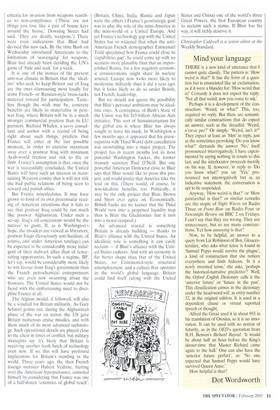Mind your language
THERE is a new kind of utterance that I cannot quite classify. The pattern is: 'How weird is that?' It has the form of a question but is enunciated like an exclamation, as if it were a blunder for: 'How weird that is!' Certainly it does not expect the reply: 'Not all that weird, now you come to ask.'
Perhaps it is a development of the construction: 'Weird, or what?' This, too, required no reply. But there are semantically similar constructions that do expect an answer, such as the dreadful: 'Weird, n'est-ce pas?' Or simply: 'Weird, isn't it?' They expect at least an 'Mm' in reply, just as the sometimes provoking 'Do you know what?' demands the answer 'No,' itself pronounced interrogatively. I have experimented by saying nothing in return to this last, and the interlocutor proceeds merrily on his way. If, however, in reply to `Do you know what?' you say 'Yes; pronounced not interrogatively but as an indicative statement, the conversation is apt to be suspended.
Anyway, 'How weird is that?' or 'How patriarchal is that?' or similar remarks are the staple of Night Waves on Radio Three or Front Row on Radio Four or Newsnight Review on BBC 2 on Fridays.
can't say that they are wrong. They are unnecessary, but so are many constructions. Yet how annoying is that?
Now, to be helpful, an answer to a query from Liz Robinson of Box, Gloucestershire, who asks what tense is found in 'Samuel Pepys would survive the plague', a kind of construction that she notices everywhere and finds hideous. 'Is it a newly invented tense,' she asks, 'perhaps the historical-narrative predictive?' Well, the Oxford English Dictionaty calls it the 'anterior future' or 'future in the past'. This classification comes in the dictionary under the head-word will, as entry number 32, in the original edition. It is used in a dependent clause or virtual reported speech or thought.
Alfred the Great used it in about 893 in his translation of Orosius, so it is no innovation. It can be used with no notion of futurity, as in the OED's quotation from R.H. Benson's Richard Raynal: 'It would be about half an hour before the King's dinner-time that Master Richard came again to the hall.' One can also have the 'anterior future perfect', as: 'No one expected that Samuel Pepys would have survived Queen Anne.'
How helpful is that?
Dot Wordsworth


























































 Previous page
Previous page